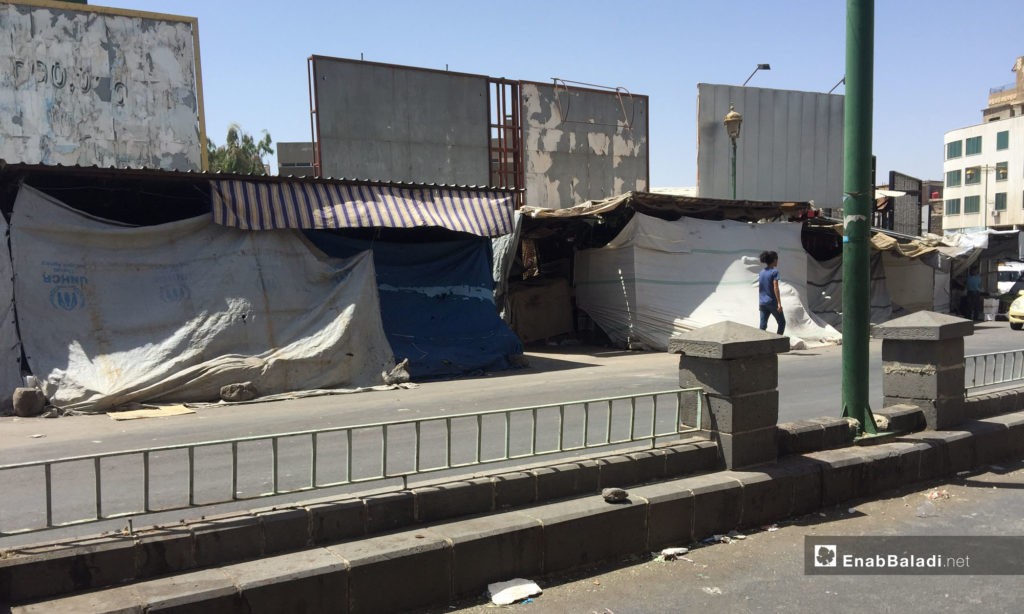Various promises were made by the government of the Syrian regime in the past a few days centralizing on its intention to launch investment projects in Sweida, which will create a developmental boost in the governorate and provide its young people with hundreds of job opportunities. However, the proposals and the projects’ plans are only part of the propaganda and a deal letter.
Sweida’s suffering from marginalization by the government of the Syrian regime when it comes to economic development is not a new thing.
Despite the governorate’s civil leaders and officials’ recurrent attempts at proposing developmental projects, which promise to provide job opportunities and self-sufficiency in relation to certain resources, no results are achieved, due to the difficulty of getting approvals, implementation permits and funding.
Unimplemented Projects
Many projects were advertised in the past months; including the one announced last April by Jihan al-Awam, director of the Syrian Investment Committee’s branch in Sweida.
She declared that four investment projects, with a value of 291 million Syrian pounds, are dedicated to Sweida.
Al-Awam, in an interview with the Syrian Arab News Agency (SANA), named the four projects as follows: The first is a transportation-based project for the transport of passengers and tourist groups inside and outside Syria, the value of which is 200 million Syrian pounds.
The second is dedicated for freezing, separating and packaging fruit and vegetables, with a value of 25 million Syrian pounds.
The third is sheep fattening and farming and fodder cultivation project, with a value of 36 million Syrian pounds.
The fourth is cows fattening and farming project with a value of 30 million pounds.
In addition to these projects, there is another of a paper factory in the industrial area in Umm al-Zaytun village on the road to Damascus, the value of which is 200 million Syrian pounds.
A feasibility study has been made, and the project’s annual revenues are estimated with 80 million, according to Alaa Abu Ammar, the director of the industrial area in the governorate, statement to the local al-Watan newspaper last September.
The project was refused by the Provincial Council despite the expectations that it would have covered all the official departments’ needs in Syria if it were to be approved.
One of the most important suspended projects, the execution of which was passed 25 years, is the al-Rayan Towers at the city center.
According to the plans, the project consists of two towers, each of them consists of 19 floors, shops, residential apartments and service facilities, designed to replace the random al-Hesbah Market, which suffers from health pollution due to its “poor” status and arbitrariness.
Does Corruption Stop these Projects?
Many reasons led to freezing these projects, some of which are triggered by the area’s people that are preventing the implementation of the al-Rayan Towers Projects saying that “it will steal their livelihoods,” in addition to the difficulty of getting licenses for their shops in the towers and the high expenses which they have to pay. All this will position them at the mercy of rich investors.
One of the City’s Provincial Council’s employees, refused to reveal his name for security reasons, told Enab Baladi that the investment projects in the governorate are at the mercy and the influence of economic corruption.
He added that the resources, designated for the projects, are usually stolen, after which a state of procrastination in the implementation of the projects begins, on allegations based on the economic conditions of the country and the challenges posed by the security situation.
According to the International Transparency Index for 2017, Syria ranks before the last on the list of the corruption prospects.
The index, in its measurements, fathoms some of the behaviors relating to corruption, such as bribery, embezzlement, the exploitation of power for personal interests and favoritism at civil services.
Suha al-Jaramani, a member of the Executive Office in Sweida, attributed the suspension of the majority of the investment projects to the Provincial Council’s disapproval, as al-Watan newspaper quoted her.
Covering Security Failure
In addition to the above mentioned, the government of the Syrian regime exploited the incidents on July 25, the Islamic State’s attack on the town of al-Shabki, in which 200 persons were killed, as to announce developmental agricultural investment projects in eastern rural Sweida, as a part of the efforts made in support of livestock according to the regime’s narrative.
Nonetheless, these projects were also committed to papers and exaggerated speech in an attempt at remedying the wounds of the area’s people.
Enab Baladi interviewed a number of the al-Shabki village’s people concerning the project; they all gave an impression of a lacking believe in the politically-controlled state foundations, as they are being used to cover what they described as the “complacency” of the Assad’s forces at facing the attack.
Local military groups, including the “Sheikh al-Karama Forces” (Sheikh of the Dignity), blamed the Syrian regime for the attack and the latest security failure in Sweida, in a statement they published on December 7, especially after it fascinated for the entry of the “Islamic State’s” fighters from southern Damascus to the governorate’s desert.

